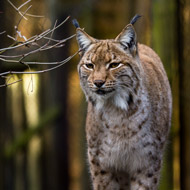Trust seeks views on Lynx reintroduction

The Lynx Trust suggests that introductions take place in Aberdeenshire, Argyll, Northumberland, Cumbria and Norfolk.
A consultation to discuss reintroducing the lynx to the UK has been launched by the Lynx UK Trust.
The consultation period will last for six weeks, ending on December 9 2015, and will discuss the reintroduction of the species to five sites in 2016.
The consultation will also consider the impact on UK ecology and industries including tourism, farming and conservation.
Earlier this year, the Lynx UK Trust announced their hopes to carry out a trial reintroduction of Eurasian lynx to the UK. Wiped out in the UK over 1,300 years ago by fur hunters, lynx have been successfully reintroduced across Europe.
The team hope that reintroduction in the UK will provide a 'valuable natural control' on the UK's overpopulated deer species, leading to the regeneration of forests and a boost to the entire ecosystem.
However, the NFU have branded the idea 'expensive with a high risk of failure'.
NFU Countryside adviser Claire Robinson said: “In our view any re-introduction of lynx would be expensive with a high risk of failure - we believe efforts, and finances, would be better focused on retaining current biodiversity.
"The NFU will respond in full to any official consultation from Natural England. We will continue to raise these very serious concerns with Natural England as the licensing body.”
The Lynx Trust suggests that introductions take place in Aberdeenshire, Argyll, Northumberland, Cumbria and Norfolk.
Until the New Year, the consultation will run at a national level, moving onto more detailed consultations at a local level in areas where trials are planned.



 The BSAVA has opened submissions for the BSAVA Clinical Research Abstracts 2026.
The BSAVA has opened submissions for the BSAVA Clinical Research Abstracts 2026.